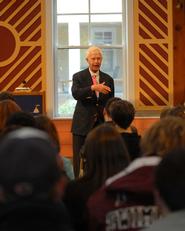
Arthur Levitt Jr., former chairman of the Securities and Exchange Commission (SEC), spoke to a large audience of students, faculty and staff in the Fillius Events Barn on Friday, Oct. 20. In 1980, Mr. Levitt established Hamilton's Arthur Levitt Public Affairs Center in honor of his father, Arthur Levitt Sr. A long-time proponent of corporate accountability and shareholder rights, Mr. Levitt Jr. spoke on the topic, "The Paradox of an Ethical Society: Are Enrons Inevitable?"
Dean of the Faculty Joseph Urgo introduced Levitt and expressed gratitude for Mr. Levitt's "constant and profound support" of Hamilton College. In turn, Levitt said that he was absolutely delighted to be at Hamilton, and that he was struck by the "passionate, intellect, and sensitivity" of the students he encountered during his visit. He said that his father, Arthur Levitt Sr., would have been proud to see the work done by the center founded in his name, which he called a "catalyst for public service."
The passing of former Enron CEO and chairman Kenneth Lay this summer marked the end of a major chapter in what Levitt called "perhaps the most infamous business scandal in recent history." Today, Levitt remarked, with the stock market at record highs, you don't hear politicians talking much about corporate responsibility, even in this election season. The effects of the Enron scandal, however, still linger. More stories of "unsavory and unethical practices" by corporations and their leaders continue to come to light. "Not a week goes by when we don't hear about CEOs having pay days while their workers and shareholders suffer," Levitt said. These scandals are reflected in the poor public opinion of CEOs by the public. In one survey, Levitt said, Fortune 500 CEOs were considered "very trustworthy" by only 2% of respondents, making them even less trusted than Congress. Meanwhile, research has also shown that MBA students are consistently the worst academic cheaters. Overall, Levitt said, there is a feeling that in the business community that the bottom line matters most and that it must be satisfied at all costs.
There is a central tension in business ethics, Levitt continued. On the one hand, corporations are private sector entities with a responsibility to maximize performance. On the other hand, corporations are important public players, affecting people's lives, impacting the economy at large, and creating both positive and negative externalities. Despite the need to consider the bottom line, Levitt believes that "good corporate governance is a responsibility to the public from whose capital you are trying to prosper." He added that the efficiency of free market system is fundamentally weakened by fraud and lies, as trust and accountability are the glue that keeps the market system together.
"The profit motive is still the fuel that runs our economy," Levitt continued. However, he said that a distinction must be made between short term greed and long term greed. Corporations should have a larger conception of profitability with longer term horizons. If corporate leaders thought in this way, Levitt argued, they would see that good corporate citizenship is actually the best path to long term profitability. The choice between profit for shareholders and benefits for a society is a false one, he said.
Levitt said that corporate governance is only as good as those doing the governing, and today there is unfortunately a lack of good ideas about how to do the right things. The Sarbanes-Oxley Act has had some positive impact by giving corporate boards the power to stop breaches of corporate ethics, but how boards use this power will determine whether or not the U.S. maintains its economic primacy in the world, he said.
Levitt offered a few guidelines for how corporations could be better citizens. First, he said that companies have an obligation to follow the best governance and regulatory practices of their industry. He gave the example of hedge funds, which he said have gotten away with "regulation light" in recent years but will soon suffer for it. Second, corporations should be proactive at improving their governance during the good times, rather than merely reacting to scandals and failures. This reactive attitude has allowed entire industries to be defined by their worst moments, such as the image of the accounting industry that emerged from the Enron scandal. Lastly, Levitt said that businesses should not only show support for good causes that affect the communities they operate in, but must actually use their power and influence to lead the fight for change.
"Public-spiritedness must cease to be the exception and become the rule," Levitt said. He hopes that the CEOs of tomorrow will understand their public responsibility and balance competing demands in order to "do well by doing good." Where will our nation find the business leaders who can change the climate of corporate America? Levitt's answer was students from colleges like Hamilton, where students learn about ethics not only from textbooks but from relationships with faculty and from dialogues with one another about what is valuable and noble. He said that America today is lacking the civic commitment of generations past, and that revitalizing this commitment is crucial to any effort to create better corporate citizenship. "In the long run, economic morality pays," Levitt said, "and civic commitment will pay off as well."
After his prepared remarks, Levitt answered questions from students about such topics as the financial sector's relationship to the regulatory bodies that oversee it, the salaries of CEOs, the importance of corporate boards, and his experience working for President Clinton. Following the question and answer session, Dean Urgo presented Mr. Levitt with a plaque to remind him of the grateful appreciation of the Hamilton community for all he has done for the College.
-- by Caroline Russell OShea '07
